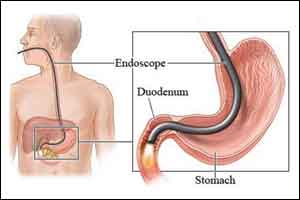- Home
- Editorial
- News
- Practice Guidelines
- Anesthesiology Guidelines
- Cancer Guidelines
- Cardiac Sciences Guidelines
- Critical Care Guidelines
- Dentistry Guidelines
- Dermatology Guidelines
- Diabetes and Endo Guidelines
- Diagnostics Guidelines
- ENT Guidelines
- Featured Practice Guidelines
- Gastroenterology Guidelines
- Geriatrics Guidelines
- Medicine Guidelines
- Nephrology Guidelines
- Neurosciences Guidelines
- Obs and Gynae Guidelines
- Ophthalmology Guidelines
- Orthopaedics Guidelines
- Paediatrics Guidelines
- Psychiatry Guidelines
- Pulmonology Guidelines
- Radiology Guidelines
- Surgery Guidelines
- Urology Guidelines
Colony Of Dancing Hookworms Suck 22 Litres Of Blood In 14 Yrs Old Boy

A unique case-study of a 14-year-old boy published recently by Department of Gastroenterology, Sir Ganga Ram Hospital in Journal of Infectious Diseases and Therapy has revealed that hookworm manifestation, if not diagnosed timely, can not only lead to their multiplication but also lead to immense blood loss and complications.
According to Dr Anil Arora, Chairperson, Department of Gastroenterology, Sir Ganga Ram Hospital , “A young boy of 14 years was referred to our centre about six months back with two episodes of passage of blood in stools. The child was suffering from iron deficiency anaemia for last two years. He was being managed with repeated blood transfusions and received 50 units (22 litres) of blood transfusions in last two years. His diagnosis could not be established in spite of various repeated tests including esophagogastroduodenoscopy (EGD), colonoscopy and radiographic studies of intestines done earlier and at our centre also which were normal. His hemoglobin was low at 5.86. “
Dr Arora further added, “In view of child’s obscure (unknown origin) gastrointestinal bleeding (OGIB), we conducted Capsule Endoscopy. (Capsule endoscopy is a procedure that uses a tiny wireless camera to take pictures of your digestive tract. A capsule endoscopy camera sits inside a vitamin-size capsule you swallow. Image attached) . The results shocked us . We could see multiple hookworms buried in the small intestine and were seen actively sucking blood with dancing movements.
Sucked blood could be seen in the cavity of hookworms, giving the red colour to hookworms. White coloured hookworms who had not yet sucked blood were seen lying quiet in the small bowel. After treatment the child recovered and his haemoglobin increased to 11 gm/dl.”
“Conventionally hookworm infestation is found commonly in Asian population. Manifestation of hookworms can be prevented by avoiding barefoot walking and maintenance of food hygiene “ opined Dr Arora .
For more details click on the link: doi:10.4172/2332-0877.1000315
Read the full study in the attached PDF file below
blood lossblood transfusionsCapsule endoscopycolonoscopyDr Anil AroraEndoscopyesophagogastroduodenoscopyhaemoglobiniron deficiencyJournal of Infectious Diseases and TherapySir Ganga Ram Hospital
Source : Press ReleaseNext Story
NO DATA FOUND

Disclaimer: This site is primarily intended for healthcare professionals. Any content/information on this website does not replace the advice of medical and/or health professionals and should not be construed as medical/diagnostic advice/endorsement or prescription. Use of this site is subject to our terms of use, privacy policy, advertisement policy. © 2020 Minerva Medical Treatment Pvt Ltd